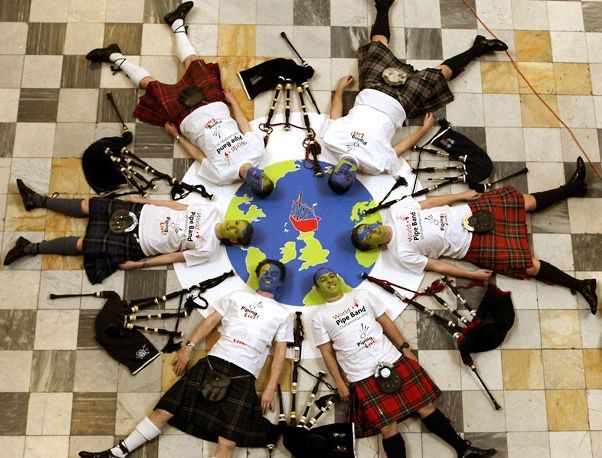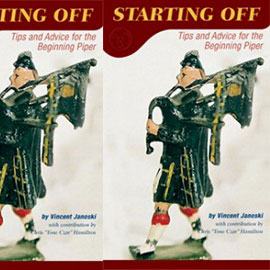Hacking Bagpipe Competitions: Create a Meaningful Experience
 The first round of the Bagadou championships was held in Brest, Brittany a couple of weeks ago. An amazing event. The contest features the top level bagad ensembles performing for about ten minutes to a relatively large audience by the sound of it. Viewers of the online live stream numbered near 2,000 at one point. I quipped on Facebook during the event: “two words for organizers of premier pipe band competitions, ‘indoors’ and ‘stage.'”
The first round of the Bagadou championships was held in Brest, Brittany a couple of weeks ago. An amazing event. The contest features the top level bagad ensembles performing for about ten minutes to a relatively large audience by the sound of it. Viewers of the online live stream numbered near 2,000 at one point. I quipped on Facebook during the event: “two words for organizers of premier pipe band competitions, ‘indoors’ and ‘stage.'”
Pipers and drummers talk a lot about making pipe band competitions more appealing to an audience and so we also talk about things like musical content and “concert formations.” Some competitions like to think they’re being innovative with those things and also change it up with format tweaks and think that is all so great. But while it is important to think differently, those things are not germane to the main issue: making the experience of a pipe band competition/performance something relevant and meaningful to both performer and audience. Once you create something that achieves that, all the rest (format, rules, structure, etc.) takes care of itself. Sometimes it is as simple as those two things—a stage indoors—at the ground level of creating a meaningful experience that folks want to perform in and watch. The rest just takes care of itself.
Take a watch and a listen to this video from the event featuring the winners Cap Caval.
Is there any doubt how this event is regarded by those who organize it? Is there any question about what they think of the performers and the audience? Is it still not clear? Let me then ask this: Judging by the ultimate experience of watching and/or playing in a high level pipe band competition, what can you deduce about how the organizers regard the performers and the audience? I’ll answer it for you: It is apparent they that care very little. All you have to do is think about what message is sent when events make pipe bands play in the pouring rain or blazing sun whether they like it or not. Now, while I’m sure they do care a great deal, and pack some premier competitions with all sorts of trappings, I’m not disparaging those who work very hard to produce piping competitions. At some point though, if we’re serious about creating greater appeal to an audience, you must stand back and consider the experience as an outward expression of what is important. If the contest is meaningful, it should be apparent to anyone either playing in it, or watching it from afar. If it is clear that the event treats itself and its participants as important, then the audience will too. There are precious few pipe band competitions that achieve that standard. We seem stuck in some tired model that picks a grassy or dusty spot outdoors, sets up some rope around a chalk circle, and the rest is not really worth attending to after that. Kind of like a bunch of kids looking for an empty lot to play a pick-up game of soccer. Yeah, it’s fun, but is that all?
As an example, take a look at the winners at the National Piping Centre’s annual junior competition held recently.
Just look at the kids in that photo and how happy they seem. Check out that shiny piping bling! Who wouldn’t be happy as a pig in slop to win some prizes like that? Those trophies are worthy of the effort those kids put forth in their piping. It’s effort we all put forth in all of our competitive activities. But what do we get here in the US for our trouble? A chance to play in a dusty corner in the blazing sun or spitting rain and nice round medal or, if we’re lucky, a plastic trophy for our trouble. That last one is no lie. The last EUSPBA pipe band championships, held in 2010 at the Glasgowlands Games in Massachusetts had, as it’s enduring prize for the effort of the top pipe band in the EUSPBA, a plastic trophy with a clip art bagpiper at the top. Now imagine an alien dropped from the sky at that moment and was asked how important those games were and how the event regarded the effort put forth by competing bands with nothing but the outward appearance and trappings of the event to go on. What would be their answer?
Now, I’m not saying that competitions are all about shiny trophies and great prizes. But how hard would it be to offer things that befit respect for the effort of performers and the time of spectators? Offering those kinds of things sends a clear message to the competitors: We are honored to have you here and celebrate your performances. Offering those kinds of things sends a clear message to the audience: We care about this competition and the performers you are about to see, and we want you to feel the same. In short, it is a meaningful experience worth seeing and worth performing at. The meaning is expressed in an overall act of giving the best experience possible to performers and spectators, inviting all to share this moment. Where would you start to provide such an experience? A stage indoors.
-
Jake Otto
-
Pereg Ar Bagol
-
pipervin
-
-
Andrew
 Pipehacker
Pipehacker









